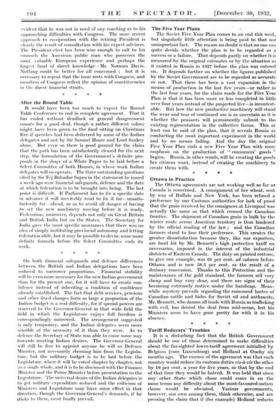After the Round Table It would have been too much
to expect the Round Table Conference to end in complete agreement. That it has ended without deadlock or general disagreement counts for a good deal, though a rather different colour might have been given to the final sitting on Christmas Eve if speeches had been delivered by some of the Indian delegates and not by Sir Samuel Hoare and Lord Sankey alone. But even so there is good ground for the claim that the path has been satisfactorily cleared for the next step, the formulation of the Government's definite pro- posals in the shape of a White Paper to be laid before a Select Committee of both Houses, in whose work Indian delegates will co-operate. The three outstanding questions cited by Sir Tej Bahadur Sapru in the statement he issued a week ago were financial safeguards, defence and the date at which federation is to be brought into being. The last point is difficult. If Parliament has to fix a specific date in advance it will inevitably tend to fix it far—unsatis- factorily far—ahead, so as to avoid all danger of having to set the new machinery moving before it is ready. Federation, moreover, depends not only on Great Britain and British India but on the States. The Secretary for India gave the most specific assurances that there was no idea of simply instituting provincial autonomy and letting federation slide, but it may be possible to devise some more definite formula before the Select Committee ends its work.
* * * *






























 Previous page
Previous page